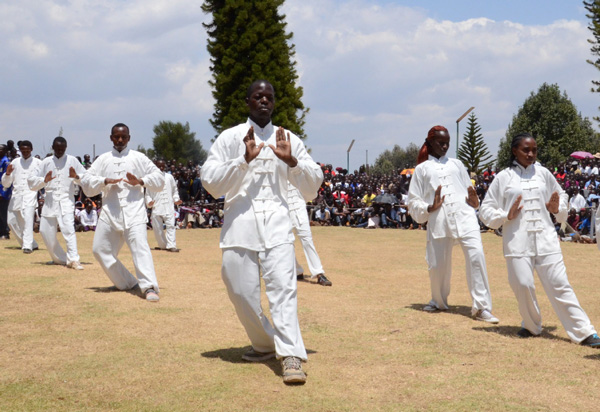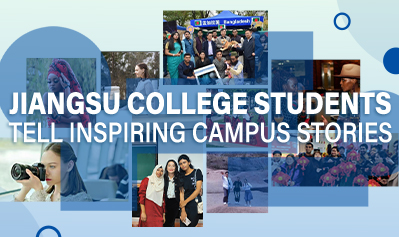University cooperation assists Kenyan farmers

Students from the Confucius Institute at Egerton University perform tai chi during a culture week. CHINA DAILY
Training programs bring modern agricultural technologies to Africa
Allan Jumba, a 27-year-old Kenyan, is a well-known specialist in agriculture and greenhouse technologies in Kenya's Vihiga county. He helps local farmers prevent common crop diseases, provides pest control services and gives greenhouse-building advice.
But he knew nothing about those technologies until he attended a training class presented by China's Nanjing Agricultural University and Kenya's Egerton University in October 2014.
"It changed my life and the lives of people around me," Jumba said. "We used to live at the mercy of the weather. The training not only gave me agricultural knowledge, but also the belief that agriculture in Kenya has a bright future."
The two universities have had a cooperative relationship since 1995. In 2012, a Confucius Institute specializing in agriculture-the world's first-was established at Egerton University.
With the assistance of the institute, Nanjing Agricultural University and Egerton University held 24 sessions. More than 1,000 students have graduated.
"The institute aims to help local people learn advanced agricultural techniques to improve their lives," said Liu Gaoqiong, a teacher with Nanjing Agricultural. He went to Kenya in 1997 to offer help and has stayed in the country more than 20 years.
"Many Kenyan teachers and students have gone to China to gain professional agricultural knowledge and pursue further studies," he said. "So far, more than 70 Kenyan students have received postgraduate and doctoral degrees from Nanjing Agricultural University."
Liu said that teaching in Kenya turns out to be more difficult than he had imagined.
"The Confucius Institute is located in a relatively remote township in Nakuru county and lacks modern teaching facilities," Liu said. "The teachers use chalk to write on blackboards in classrooms filled with students. Students who don't come early have to stand at the back of the classroom during the whole class.
"Sometimes we hold activities in halls with mottled walls, primitive equipment and no electricity. But none of these things affect the students' enthusiasm for learning."
Li Yuan, the Chinese president of the Confucius Institute, said that China and Kenya have implemented several programs, including China-Kenya cooperation in higher education, sustainable agriculture and a molecular biology laboratory over the past three decades.
"The two universities also plan to hold training classes on modern agriculture in neighboring countries, such as Rwanda, Tanzania and Mozambique," Li said. "We have asked teachers from the two universities to compile books on practical agricultural skills for six African countries."
With the help of the Chinese government, 100 Kenyan students will go to China for master's and doctoral degrees in agriculture through 2022.
More Chinese and Kenyan universities will cooperate with the institute to train talent and improve the local economy, Li said.
Guo Jun contributed to this story.


 Jiangsu college students tell inspiring campus stories
Jiangsu college students tell inspiring campus stories